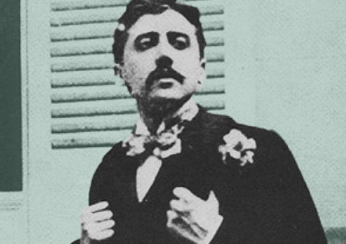
Marcel Proust struck up a friendship with Marie Nordlinger, an aspiring painter and sculptor, based on a shared love of Gothic cathedrals, as well as architecture critic John Ruskin’s descriptions of them. Nordlinger encouraged Proust with his translation of Ruskin’s Sesame and Lillies, assisting his efforts with her native English. Here Proust writes to Nordlinger, reflecting on the relationship of writers to their words while arguing that understanding lies not in knowledge, but in experience.
March, 1900
To Marie Nordlinger –
Your verses are charming and evoke in my memory the delightful spring bouquet you once brought me from an excursion of yours, which my hay fever prevented my emulating. But you are a poet and need not go into the fields to bring back flowers. Don’t complain about not having learned. There is nothing to know. Even what is called technical competence is not properly speaking knowledge, because it does not exist outside of the mysterious association of our memory and the skill acquired by our own inventiveness when it comes in contact with words.
Knowledge, in the sense of a thing that is all done outside ourselves and that can be learned as in the sciences, counts for nothing in art. On the contrary, it is when the scientific connections between words have disappeared from our minds and have taken on a life in which the chemical elements are forgotten in a new individuality, that the technique, the skill that recognizes their antipathies, humors their wishes, knows their beauty, conveys their forms, assorts their affinities, can begin. And this exists only when a creature is a soul and no longer so much carbon, so much phosphorus, etc. Victor Hugo, whose Shakespeare I am afraid I do not like, says,
Car le mot, qu’on le sache, est un être vivant.
[For the word, be it known, is a living thing.]
You know it. So you love words, you don’t harm them, you play with them, you confide your secrets to them, you teach them how to paint, you teach them how to sing. And your horror of yellow is a symphony in yellow, which is wholly exquisite; God himself seems to have wanted to give a sample of everything He possesses in yellow, from the flowers in the field to the gleam of the firmament. One could not set this down in painting, yet you have painted it in writing.
This Poetry of Architecture of Ruskin’s, which you speak of, is there anything in it about cathedrals? Which ones? And the other works you speak of, do they mention anything, even incidentally, about certain cathedrals? Do you know of any memoir of Ruskin’s on flamboyant architecture on the banks of the Somme? In a future letter I shall tell you about Julien Edouard whom I saw a month ago. But he shows only Saint-Ouen and not the cathedral. What did he say to you about Ruskin? He claims that Ruskin said to him that Saint-Ouen was the most beautiful Gothic monument in the world, but in Seven Lamps Ruskin says that it is a hideous monument!
Your respectful friend,
Marcel Proust
From The Letters of Marcel Proust. Translated and edited by Mina Curtis. Random House: New York (1949), p. 66-7.
FURTHER READING
Another letter to Marie Nordinger presented by the good people at Proust Ink.
An interview with U.S. Justice Stephen Breyer on reading Proust.
Ruskin’s and Proust’s habits of reading.
Nordlinger’s intimate relationship with Proust (apparently they read Ruskin together in her bedroom).


